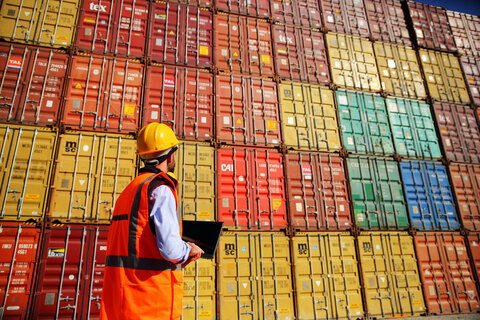Tad DeHaven
The International Longshoremen’s Association (ILA) strike, which halted the movement of exports and imports from East and Gulf Coast ports for three days, has been suspended. The union had been demanding a substantial wage increase and tighter restrictions on port automation. In a tentative agreement, the ILA got the substantial wage increase (62 percent over six years), but automation will continue to be negotiated. The new date for the parties to come to agreement on a new contract is January 15, 2025.
Of the myriad issues that have been at play, it is the union’s vehement opposition to any degree of automation that arguably deserves the most scrutiny. A major purpose of a union is to preserve the jobs of its members, so it’s no surprise the ILA opposes the introduction of labor-saving technology. The past is replete with examples of such opposition: weavers vs. power looms, railroad workers vs. automatic coupling systems, miners vs. continuous mining machines, automobile workers vs. automated assembly lines, telephone workers against automated switching systems, postal employees vs. automated mail sorting machines, and on and on.
There’s another example that is particularly relevant: the ILA’s mid-20th century opposition to containerization. A 1977 New York Times article on an ILA strike that year reported:
Behind the strike that has tied up container cargo in Gulf and East Coast ports is a revolution in transportation that has come to dominate ocean shipping in only 20 years.
[.…]
The revolution—the use of containers —has superseded longshoremen’s arms with the mechanical arms of giant cranes and has replaced teeming waterfronts full of wooden crates and burlap sacks with vast, stark marshaling yards packed with sleek, steel boxes. The boxes, called containers, become instant trailer vans when they are swung off ships and snapped onto truck chassis.
Containerization cost many union dockworkers their jobs. But those losses were dwarfed by the consequent economic benefits realized by countless American consumers, businesses, and workers in other industries.
The most recent World Bank/S&P Global rankings of 405 ports around the world show US port performance continues to underachieve. The US’s top port (Philadelphia) comes in at only 50th. Most are in the middle or ranked toward the bottom. (For more on this and related issues at US ports, see Scott Lincicome here and here.)
The United States lags Europe and Asia in its use of port automation. While the relative lack of automation is just one factor impacting US port performance, it’s certainly an issue. A recent Government Accountability Office (GAO) report compared select US and foreign ports on automation utilization. As the GAO table shows, the ten largest US container ports it reviewed utilize less automation technology compared to the foreign ports examined. One reason the GAO cites is labor agreements that prohibit automation.
Intransigent labor unions aren’t the only reason the US ports are behind. The GAO notes that the foreign ports it reviewed all handle higher cargo volumes than the US ports. Automation technology isn’t cheap, so the higher the volume the likelier a positive return on the investment. Another issue is foreign ports move more containers from one ship to another ship (transshipment), which lends itself to utilizing automation. In both instances, US regulations play a key role.
As Colin Grabow points out, transshipment is nonexistent in the US because of the protectionist Jones Act. He also explains that the Jones Act and other government regulations inhibit the dredging of US ports for capacity expansion.
The ILA strike makes it tempting to say the ports should simply be automated and labor taken out of the equation. As it currently stands, however, automation isn’t a panacea. The GAO found that automation can be a mixed bag performance-wise, and as noted, it may not make sense from an investment standpoint. But setting aside government policies that can and do negatively impact automation performance and cost, the key phrase is as it currently stands. Unless overzealous regulators get in the way, future technological advancements will lead to more effective and efficient automation tools for ports to utilize.
That’s what’s maddening about the union’s government-granted ability to gum up the progress works. The longer special interest roadblocks remain in front of automaton adoption, the longer market forces will be held at bay, and thus the longer it will take for the US to realize the benefits of automation a la containerization. As Reason’s Eric Boehm asks, “… if maximizing the number of union jobs at ports was the highest value to society … [w]hy not demand a ban on cranes, forklifts, and tractor-trailers too?”
In the wake of the strike, the Biden administration and presidential candidate Vice President Harris reflexively sided with the Democratic Party’s union ally. Tellingly, that’s despite the heavy damage a strike could have imposed on the economy just a month away from election day. On the other side, a previous press release from the ILA says that Republican presidential candidate Donald Trump “promised to support the ILA in its opposition to automated terminals in the U.S.”
It remains to be seen what the final agreement on a new labor contract says about the ability to use automation at East and Gulf Coast ports. A crack in the union’s wall that allows for some small degree of automation may be the ceiling. However, if there’s hope to be had from the discourse surrounding the strike, it’s that more Americans will have woken up to the counterproductive role that government-favored special interests play in their lives.

